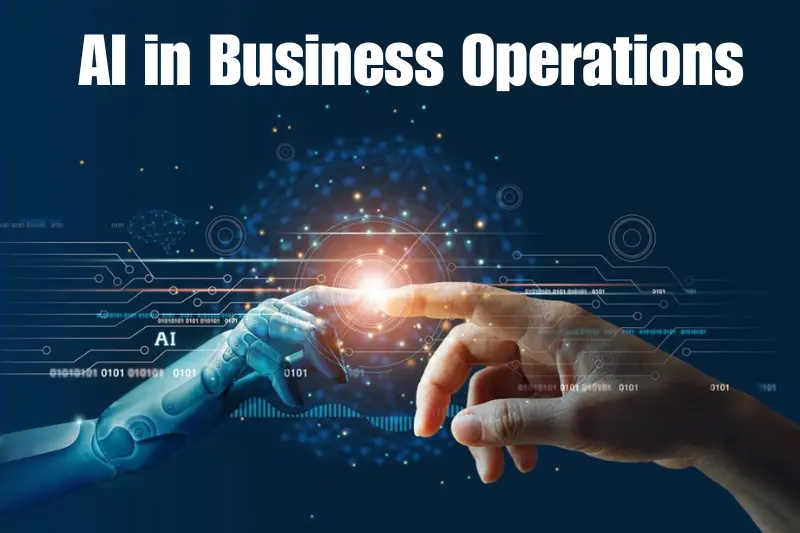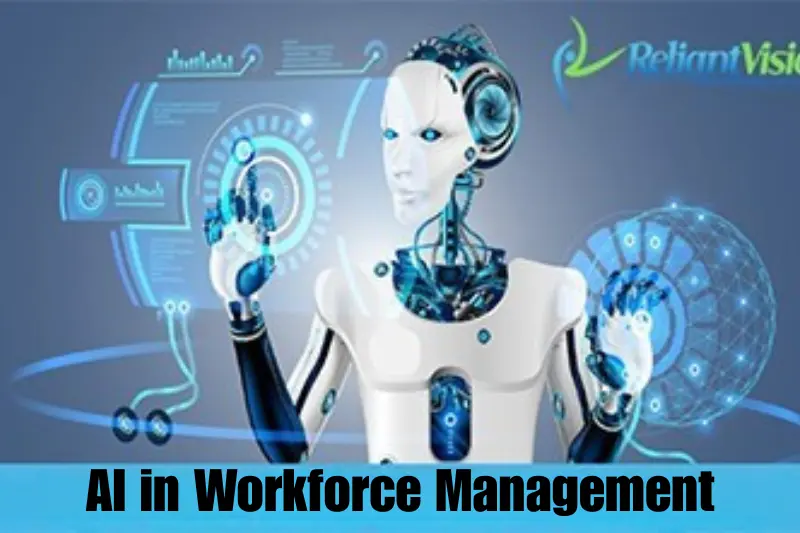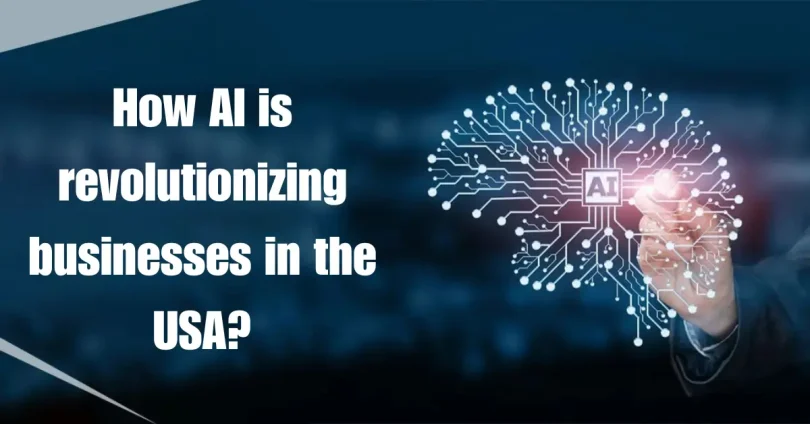Artificial Intelligence (AI) is fundamentally changing the way businesses operate across the USA. This groundbreaking technology is no longer just a buzzword; it is a transformative force that is reshaping industries, optimizing operations, improving customer experiences, and driving innovation.
In the USA, companies of all sizes are embracing AI to streamline processes, enhance decision-making, and gain a competitive edge. In this detailed article, we explore how AI is revolutionizing businesses in the USA? focusing on its impact on various aspects of business operations, customer service, marketing, workforce management, and innovation.
1. AI in Business Operations
 AI is revolutionizing business operations in the USA by increasing efficiency, reducing costs, and improving overall performance. From automating routine tasks to enhancing supply chain management, AI is transforming how companies function.
AI is revolutionizing business operations in the USA by increasing efficiency, reducing costs, and improving overall performance. From automating routine tasks to enhancing supply chain management, AI is transforming how companies function.
Automating Routine Tasks
AI has made it possible to automate a wide variety of repetitive and time-consuming tasks. Businesses are using Robotic Process Automation (RPA) and AI tools to handle tasks such as data entry, invoicing, and document management.
These tools not only save time but also reduce errors, allowing employees to focus on higher-value work. For example, UiPath and Automation Anywhere are leading platforms that help organizations automate administrative tasks, improving productivity and efficiency.
You may also like to read this:
Latest Updates On Apple, Google, And Microsoft In 2025
Top AI-Powered Apps Of 2024 To Enhance Your Daily Life
Biggest Tech Company Updates Of 2025: AI & Innovation
Latest Tech News USA: April 2025 Key Highlights
Breaking Technology News Today: Cybersecurity And AI News
How New AI Advancements 2024 Are Changing Industries
Supply Chain Optimization
AI has significantly enhanced supply chain management, particularly in industries like retail, logistics, and manufacturing. AI-powered algorithms are used to predict demand, optimize inventory levels, and ensure faster deliveries.
Amazon is a prime example, using AI to forecast demand for products, optimize warehouse storage, and enhance delivery logistics. AI-driven tools help businesses minimize stockouts, reduce waste, and improve customer satisfaction by ensuring products are available when and where they are needed.
Predictive Analytics for Decision-Making
Predictive analytics powered by AI allows businesses to make more informed, data-driven decisions. By analyzing historical data, AI algorithms can identify patterns and trends, enabling companies to forecast future outcomes and adapt their strategies accordingly. For example, Netflix uses AI to predict user preferences and suggest content, which drives user engagement. Similarly, businesses in the financial sector, such as Goldman Sachs, use AI to predict market trends and assist in investment decisions.
2. AI in Customer Experience
The use of AI is revolutionizing customer experience in the USA by enabling businesses to provide more personalized, efficient, and responsive services.
Personalized Customer Interactions
AI is enabling businesses to offer highly personalized experiences for their customers. By analyzing vast amounts of data, AI helps companies understand customer preferences, behaviors, and past interactions. For instance, Walmart and Target use AI to offer tailored product recommendations based on customers’ browsing history and purchase patterns. Personalized recommendations not only increase customer satisfaction but also boost sales and brand loyalty.
AI-Powered Chatbots and Virtual Assistants
AI-powered chatbots are enhancing customer service by providing quick, efficient, and around-the-clock support. Bank of America, through its chatbot Erica, assists customers with tasks such as managing their accounts, transferring funds, and answering common inquiries. Similarly, Sephora uses an AI-driven virtual assistant to help customers find beauty products that best suit their preferences. These AI systems reduce the need for human agents, improve response times, and offer consistent service.
Voice Commerce and AI Assistants
Voice assistants such as Amazon Alexa and Google Assistant are becoming integral to e-commerce in the USA. Consumers can now make purchases, track orders, and inquire about products simply by speaking to their voice assistants. Businesses are adapting to this trend by optimizing their platforms for voice search and integrating voice commerce into their sales strategies. This creates a more convenient and hands-free shopping experience for customers, driving sales and engagement.
3. AI in Marketing and Advertising
AI is revolutionizing marketing and advertising by enabling businesses to create more targeted, efficient, and impactful campaigns.
Targeted Advertising Using AI
AI has transformed the way businesses approach digital advertising by enabling highly targeted campaigns. Google Ads and Facebook Ads use AI to analyze user data and optimize ad placement, ensuring that businesses can reach their desired audience with relevant content. AI algorithms track user behavior and preferences, allowing businesses to serve personalized ads based on individuals’ interests and past actions. This improves the efficiency of advertising campaigns and increases conversion rates.
AI-Driven Content Creation
AI tools are now capable of generating content automatically, reducing the time and resources needed to create marketing materials. Platforms like Jasper (formerly Jarvis) and Copy.ai use AI to generate blog posts, social media updates, product descriptions, and email campaigns. This not only speeds up content production but also helps businesses scale their content marketing efforts without sacrificing quality. AI also allows businesses to test and optimize their content to ensure it resonates with their target audience.
Sentiment Analysis for Marketing Insights
AI-driven sentiment analysis tools help businesses gain valuable insights into customer opinions and feedback. By analyzing social media posts, reviews, and survey responses, businesses can gauge public sentiment about their products, services, and brand. Companies like Coca-Cola use sentiment analysis to understand customer reactions to marketing campaigns and adjust their strategies accordingly, ensuring that their messaging aligns with customer expectations.
4. AI in Workforce Management

AI is changing the way businesses in the USA manage their workforce, from recruitment to productivity optimization and employee development.
AI-Powered Recruitment
AI has streamlined the recruitment process by automating candidate screening, interview scheduling, and resume analysis. AI tools like HireVue and Pymetrics use machine learning to evaluate applicants based on their skills, experience, and fit for the company culture. This reduces human bias in hiring and helps businesses make more data-driven recruitment decisions. AI-powered systems also help companies identify top talent more quickly and efficiently, saving time and reducing hiring costs.
Improving Employee Productivity
AI is also being used to enhance employee productivity. AI-powered collaboration tools like Slack and Microsoft Teams use AI to recommend relevant channels, files, and conversations to employees, improving information flow and reducing the time spent searching for resources. Additionally, AI can automate administrative tasks, such as scheduling meetings and sending reminders, allowing employees to focus on high-priority tasks that contribute to business growth.
AI in Employee Development
AI is revolutionizing employee training and development by providing personalized learning experiences. Platforms like Coursera and LinkedIn Learning use AI to recommend courses and learning paths tailored to employees’ skills and career goals. This enables businesses to offer continuous learning opportunities, helping employees stay competitive and adapt to evolving market demands.
5. AI in Product and Service Innovation
AI is driving innovation in the development of new products and services, enabling businesses to meet evolving customer needs and stay ahead of the competition.
Healthcare Innovation with AI
In the healthcare industry, AI is transforming patient care, drug discovery, and diagnostics. IBM Watson Health is using AI to analyze medical data and assist healthcare providers in diagnosing diseases and recommending personalized treatments. AI is also being used to speed up drug discovery by analyzing vast datasets and predicting the efficacy of potential drugs, significantly reducing the time and cost associated with developing new medications.
Autonomous Vehicles
The automotive industry in the USA is undergoing a revolution with the development of autonomous vehicles powered by AI. Companies like Tesla and Waymo are using AI to enable self-driving cars, which use sensors and machine learning algorithms to navigate roads safely and efficiently. Autonomous vehicles have the potential to reduce traffic accidents, lower transportation costs, and transform the way people travel.
AI in Financial Services
AI is also playing a crucial role in the financial sector. Financial institutions like JP Morgan and Goldman Sachs use AI to analyze large datasets and predict market trends, enabling better investment decisions. AI also enhances fraud detection systems, helping banks and financial services companies identify and prevent fraudulent activities in real time. AI-driven robo-advisors are providing personalized financial advice to customers, making it more accessible and affordable.
6. The Future of AI in Business in the USA
Looking to the future, the role of AI in business is only expected to grow. With advancements in technologies like quantum computing and reinforcement learning, AI’s potential to transform industries is limitless. However, as AI continues to evolve, businesses must address ethical concerns related to privacy, data security, and the potential displacement of jobs.
Conclusion: How AI Is Revolutionizing Businesses In The USA?
How AI is revolutionizing businesses in the USA? is evident in its transformative impact across multiple sectors. From improving business operations and customer experiences to optimizing marketing strategies and driving innovation, AI is a catalyst for change.
Companies that leverage AI to enhance efficiency, personalize services, and drive product innovation will be better positioned to compete in the rapidly evolving market. As businesses continue to adopt and integrate AI technologies, those that embrace these advancements responsibly will be able to navigate the future with greater agility and success.
FAQs
1. What is AI and how is it used in businesses?
AI refers to machines that simulate human intelligence, used in businesses to automate tasks, improve decision-making, analyze data, and enhance customer experiences.
2. How does AI automate routine tasks?
AI automates repetitive tasks like data entry and customer service inquiries, increasing efficiency and freeing up employees for more strategic work.
3. How does AI improve customer experience?
AI personalizes interactions, provides real-time support through chatbots, and offers tailored product recommendations, boosting customer satisfaction and loyalty.
4. How is AI used in marketing?
AI helps target ads, optimize campaigns, automate content creation, and analyze customer sentiment to improve marketing efficiency and reach.
5. What are AI-powered chatbots?
AI-powered chatbots handle customer inquiries, offering 24/7 support, reducing operational costs, and improving customer service by providing quick responses.







